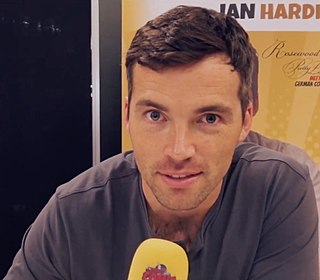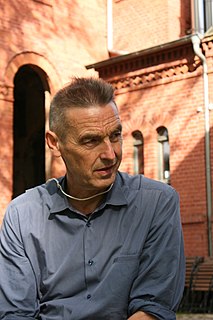A Quote by Mario Bunge
My Third-World roots remind me that the vast majority of our fellow human beings live hungry, sick, and uneducated, and that most social scientists, even in that world, ignore that ugly reality. This is why my papers in mathematical sociology deal not with free choice among 30 flavors of ice-cream, but with social structure, social cohesion, and social marginality.
Quote Topics
Among
Beings
Choice
Cohesion
Cream
Deal
Even
Fellow
Fellow Human Beings
Flavors
Free
Free Choice
Human
Human Being
Human Beings
Hungry
Ice
Ignore
Live
Majority
Mathematical
Me
Most
Our
Papers
Reality
Remind
Roots
Scientists
Sick
Social
Social Structure
Sociology
Structure
Third
Ugly
Uneducated
Vast
Vast Majority
Why
World
Related Quotes
We're not just social animals in the conventional way that people think. It's not just a bunch of us who hang out together. We have a very specific pattern of ties, and they have a particular shape and structure that is encoded in our genes. It means that human beings have evolved to live their lives embedded in social networks.
For one to be free there must be at least two. Freedom signifies a social relation, an asymmetry of social conditions: essentially it implies social difference--it presumes and implies the presence of social division. Some can be free only in so far as there is a form of dependence they can aspire to escape.
Those social behaviors which automatically preclude the building of a democratic world must go - every social limitation of human beings in terms of heredity, whether it be of race, or sex, or class. Every social institution which teaches human beings to cringe to those above and step on those below must be replaced by institutions which teach people to look each other straight in the face.
Our normal expectations about reality are created by a social consensus. We are taught how to see and understand the world. The trick of socialization is to convince us that the descriptions we agree upon define the limits of the real world. What we call reality is only one way of seeing the world, a way that is supported by social consensus.
Almost certainly, the first essential component of social justice is adequate food for all mankind. Food is the moral right of all who are born into this world. Yet today 50 percent of the world’s population goes hungry. Without food, man can live at most but a few weeks; without it, all other components of social justice are meaningless.
I think sociologists are among the best at thinking about emergence, of thinking about the ways that the society is more than the sum of the individuals. And I've found that much of the wisest writing on human social nature comes from sociology and anthropology, not from my own field of social psychology.
You could make a good case that the history of social life is about the history of the technology of memory. That social order and control, structure of governance, social cohesion in states or organizations larger than face-to-face society depends on the nature of the technology of memory - both how it works and what it remembers. In short, what societies value is what they memorize, and how they memorize it, and who has access to its memorized form determines the structure of power that the society represents and acts from.
I think it is now time for social scientists to step out of the shadow and to establish an advanced social sciences methodology that integrates science (third-person view) social transformation (second-person view) and the evolution of self (first-person view) into a coherent framework of consciousness-based action research









































